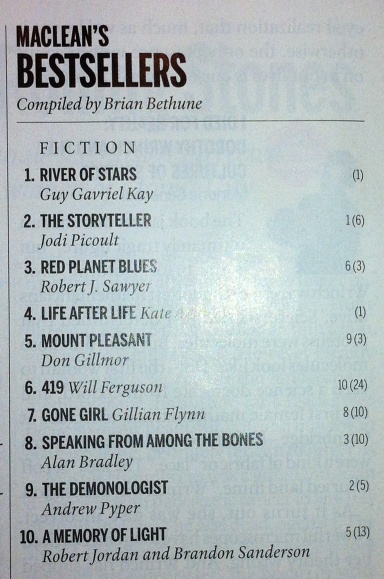“Bestselling author” has become a meaningless term
by Rob - July 28th, 2015.Filed under: Bestsellers Lists.
Before the Amazon/self-publishing revolution debased/democratized (take your pick) the term, “bestsellerdom” was easy to ascertain: a book was a bestseller when it appeared on a recognized published-in-print bestsellers list (the most important of which was the one in The New York Times). Such lists do appear still in newspapers and magazines (in Canada, the important ones are the national ones appearing in The Globe and Mail and Maclean’s, Canada’s weekly newsmagazine).
Unfortunately, Amazon has provided so many sub-sub-sub categories that we’re just this side of people claiming bestseller status because they’ve hit number one on a list that goes:
Amazon > All Books > Kindle > Fiction > Fiction Written By Me
(In other words, just like in Kindergarten, everyone who shows up gets a gold star; countless authors have hit top-10 in some Amazon sub-sub-sub category for an our or two, which is all it takes for some of them to forevermore tout themselves as bestselling authors.)
But the bottom line is, in general, “bestselling author” or “bestselling novel” is not something you yourself claim or assert; it’s something you document with a citation to the authority that conferred that status. The beauty of newspaper and magazine bestsellers’ lists, compiled either weekly or monthly, is that they established that you hadn’t just had a statistical blip in sales (“For one hour my ebook was the #4 bestseller in an obscure sub-sub category on Amazon!”) but that you’d made it to that stature for at least seven days or a full month, in a broad (fiction / nonfiction / YA / hardcover / paperback) category in which there are a great many books.
I’ve hit #1 on the highest-level category for my field — science fiction — on three national Amazon lists — .com, .ca, and .co.uk — and, for that matter, #1 on .com’s technothriller list — and #1 on the Audible science-fiction monthly bestsellers’ list, and I’ve been #1 on most of the regional lists in Canada (such as the one published in the Winnipeg Free Press) and even some American ones (for instance, the Palm Beach Daily News) and #1 on the bestsellers list published in Locus, the trade journal of the SF&F fields.
But just as my publishers and readers only care about awards you’ve actually won that people have actually heard of, they only care (if readers care at all) about such things when they recognize the name of the bestsellers’ list you’ve actually appeared on. First “author” fell by the wayside as a term meaning one had actually accomplished something, and generic “bestselling author” has likewise lost any cachet.
I am proud of the one illustrated above. I’ve been on the list in Maclean’s, which is Canada’s national newsmagazine, often starting in 2000, but this was the highest I’ve made it on their list: the #3 bestselling novel of any type, by authors of any nationality, across all of Canada, for the week.The numbers to the right are the book’s ranking the previous week (I was at #6) and the total number of weeks, including this one, that the book has been on the list so far (so this was my third week).

Robert J. Sawyer online:
Website • Facebook • Twitter • Email


July 28th, 2015 at 9:15 pm
I would have to agree, if the big-pants bestseller lists weren’t fixed to within an inch of their lives.
After I found out that publishers use distributed buyouts to fake their way onto the lists, and started seeing these yokel YouTubers bounce through the NYT lists once a month, I lost what little faith I had left in them. I put more stock in Amazon bestseller lists, because at least those represent actual sales to actual, living-breathing customers.
July 28th, 2015 at 11:36 pm
One way to deal with this issue is to publish real numbers, for example: “Myron Schmendrake, whose books have confirmed sales of over 50,000 copies . . . .” That, or an author could list how many books he/she sold in a given month. In most circles, someone who sells 12,000 or 13,000 books in a month is at least a moderate success, irrespective of genre, while someone who sells 100,000 in a month has hit the ball out of the park, and 1000 copies–even if one is a “bestseller” wouldn’t be that impressive.
August 9th, 2015 at 2:52 pm
I agree. It seems that any author will put “bestselling author” on the cover of their book just to gather hype and attention. It truly has become a meaningless term.
I can only hope that I will one day EARN that title, as you have, my friend.
Best of wishes to you.